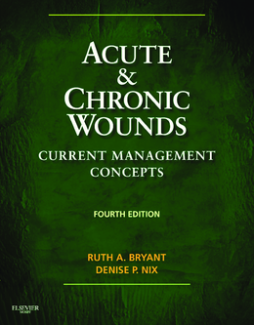
Additional Information
Book Details
Abstract
Using a multidisciplinary approach, this all-inclusive resource provides clinicians with a strong knowledge base for understanding the complete spectrum of wound care, including the structure of the skin, its functions, types of skin damage, physiology of wound healing, and general principles of wound management. Seven new chapters cover Principles of Practice Development; Skin Care Needs of the Obese Patient; Foot and Nail Care; Facilitating Adaptation; Support Surfaces; Devices and Technology in Wound Care; and Reimbursement and Billing. Recent advances in disease etiology, diagnosis, and treatment are discussed in appropriate chapters and each chapter opens with a list of learning objectives and closes with review questions.
- Authored and contributed by respected experts in wound care management - members of Wound, Ostomy and Continence Nurses Society (WOCN) and Wound Healing Society (WHS).
- Risk assessment scales are included to assist with determining a patient's risk for developing a wound.
- Assessment tools are provided to assist the clinician with wound evaluation, care, and treatment.
- Patient compliance and guidance on how to identify and resolve issues of non-compliance are discussed in the new Facilitating Adaptation chapter.
- The multidisciplinary approach to wound care management is discussed in a single chapter and applied throughout the text to demonstrate how this approach works and why it is critical to successful patient outcomes.
- A wound care product formulary lists wound care products by category, usage guidelines (indications and precautions), and helpful hints is included to facilitate outcomes measurement and quality improvement.
- Algorithms demonstrate the critical steps for topical wound care management.
- Key information is highlighted in box or table format to enable the user to quickly focus on selected information.
- Clearly defined chapter objectives provide a focused guide to key elements within each chapter.
- A self-assessment exercise is included at the end of each chapter to provide a review of critical chapter concepts.
- Seven new chapters: The Multidisciplinary Team Approach to Wound Management; Skin Care Needs of the Obese Patient; Foot and Nail Care; Facilitating Adaptation; Support Surfaces; Devices and Technology in Wound Care; and Reimbursement and Billing.
- Revisions to every chapter reflect the most recent advances in disease etiology, diagnosis, and treatment.
- Updated content reflects the latest technologic advances and therapies to strengthen the clinician's knowledge base in available treatment options.
- Assessment tools to assist the clinician with evaluation, care, and treatment.
- Explanation of how to set up a practice and the principles of practice development.
